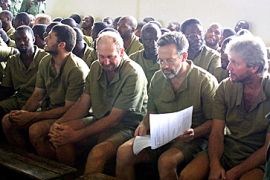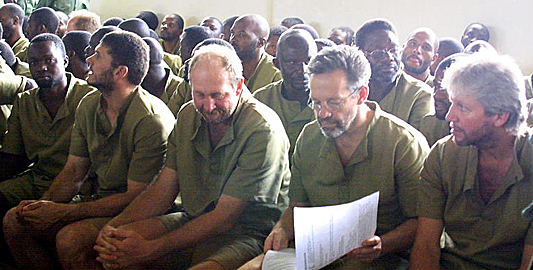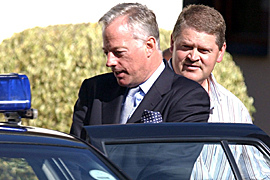A mercenary’s tale
How mercenaries’ loose talk led to failed coup and a prison term in Equatorial Guinea.


Unfortunately for Mann, reading, his colleagues talked about the coup [AFP]
Simon Mann, a British mercenary accused of plotting to overthrow the government of Equatorial Guinea, has been convicted and sentenced to 34 years in prison by a court in Malabo, the country’s capital.
Adam Roberts, an expert on mercenaries in Africa and author of The Wonga Coup, an account of the incident, reveals why the coup went wrong, what may lie in store for Mann and why coups will always be with us.
As Simon Mann starts his 34 years (and two days) sentence in Black Beach prison, Malabo, the capital of Equatorial Guinea, he has plenty of time to ponder what went wrong with the Wonga Coup.
His conviction and sentencing on Monday could hardly have been a surprise for the mercenary.
He had repeatedly admitted, and said sorry for, planning the remarkable, dare-devil operation to overthrow the president of Equatorial Guinea in March 2004.
The truth is that Mann – and the many others who dreamed up, plotted, financed and supported the scheme, in order to get a slice of the oil revenues now flooding the west African country – made far too many mistakes.
In researching my book, The Wonga Coup, which tells the story of the plot, I spoke to many who participated in the attempt, and to those who helped to foil it.
Loose talk
One message from them was loud and clear: nobody could keep their mouth shut about the conspiracy.
Two weeks before the coup attempt, early in 2004, the plot was discussed at a semi-public meeting at Chatham House, a international relations think-tank in London.
A variety of freelance “intelligence agents,” including a friend of Mann, were producing regular reports on the planning of the operation.
As a result, various governments knew about the plans.
In the end, Angola’s government tipped off the presidency of Equatorial Guinea, but a host of others might have done so.
One of the plotters rushed around oil firms in America and elsewhere canvassing their views on the “regime change” in Equatorial Guinea.
Thatcher denial
In fact, just about the only person who claims he did not know about the coup attempt is Sir Mark Thatcher, son of Margaret Thatcher, the former British prime minister.
 |
| Sir Mark Thatcher denies helping to fund the coup [AFP] |
Sir Mark admits giving money to Mann in the build up to the coup attempt.
He told me that he thought his money would be used to rent an air ambulance for a business in West Africa.
Mann, by contrast, said in court that the money from his friend was used to pay for a plane to fly in the new puppet leader, Severo Moto, who would have been installed into the presidency if the coup had succeeded.
Prison for Mann in Malabo may not represent the sort of horror that many have suffered in that country.
The government of Equatorial Guinea is taking care to treat the star prisoner as well as possible, reportedly allowing him to make frequent international phone calls and providing food, wine and reading matter (I’m pleased to hear that he has a copy of my book, for example).
And Mann, of course, cannot be cursing his fate too badly.
He took a great risk and lost, and might well have been killed in different circumstances.
Yet none of this justifies a rigged trial or detaining him for three more decades.
Hired gunmen
Who knows whether a deal has been struck, or whether it would be kept, to see Mann leave Equatorial Guinea after a presidential pardon.
 |
| Mann’s health may provide an excuse for him to be sent to prison in Britain [AFP] |
Perhaps his poor health would provide an excuse to see him sent to Britain.
But the others who still sit in jail in Malabo, those convicted this week along with Mann, and those convicted back in 2004 for the same case, may not get off so lightly.
One message, of course, to other would-be coup plotters is that the days are over when mercenaries toppled African regimes, as happened in the 1970s in the Comores, and as was attempted elseswhere.
But it is hard to believe that hired gunmen, who love the thrill of combat and the risk of death that comes with seeking extraordinary rewards, would really be deterred by the threat of prison.
It is hard to believe that the Wonga Coup will be the last such coup plot that Africa, or the world, will ever see.
The views expressed by the author are not necessarily those of Al Jazeera.